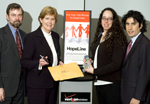Verizon Wireless donates phones, money
by
Heather WoolwinePublic Relations
While fortunes are given to the health care industry each year by thankful individuals, civic-minded companies, and non-profit organizations, psychiatric services often are not beneficiaries of grass-roots fundraising campaigns. They generally are below the radar of large companies looking for a good cause.
 Dr. Dean
Kilpatrick, from left, with Verizon Wireless' Harryette G. Berry,
and Drs. Alyssa Rheingold and Michael A. deArellano.
Dr. Dean
Kilpatrick, from left, with Verizon Wireless' Harryette G. Berry,
and Drs. Alyssa Rheingold and Michael A. deArellano.Bucking the norm, Verizon Wireless donated 30 cell phones and $5,000 to MUSC’s COPE (Community Outreach Program - Esperanza) Domestic Violence Clinic, a division of the MUSC National Crime Victims Research and Treatment Center (NCVC). Made possible by the company’s HopeLine phone recycling program, the donation is part of a larger nationwide commitment to prevent domestic violence and raise awareness of the issue.
“I think we need partnerships in the community first of all for research,” said Bob Malcolm, M.D., MUSC Continuing Medical Education associate dean and interim Psychiatry chairman. “And without new treatments, we will never advance psychiatry to the point that other disciplines in medication already have. We are the stepchild of the medical establishment. We need funding for research so that our care of patients will be on par with cardiology, gastroenterology, surgery and other disciplines.”
Since 2001, the Verizon Wireless HopeLine program has collected more than 3.5 million phones and recycled more than 800,000 of them. Proceeds from the program benefit victims of domestic violence and non-profit advocacy agencies, while providing essential communication tools of wireless phones and wireless services, plus financial grants.
In addition to free wireless phones, service and voice mailboxes for victims, HopeLine includes community and corporate awareness initiatives, and a bilingual “Invest in Yourself” program designed to help survivors re-enter the workforce.
“We are very appreciative of the support that Verizon has provided,” said Dean Kilpatrick, M.D., director and founder of the MUSC NCVC. “It will enable us to continue supporting women of domestic violence.”
HopeLine wireless phones come with 3,000 minutes, a private voicemail box and simple dial keys (#HOPE) that connect directly to the National Domestic Violence Hotline. “As a major employer in the greater Charleston area, we seek ways to align our products and services with our community’s needs,” said Jeremiah Knight, director of the Verizon Wireless Call Center in North Charleston. “The counselors here at the COPE program are doing a great job, and we hope this gift can help others.”
The COPE Clinic provides mental health support to the victims of domestic violence, who are in underserved communities. The clinic’s goal is to provide empirically informed clinical care, while being sensitive to the needs of domestic violence victims. Overall, the NCVC’s programs are concentrated in four areas: scientific research, evidence based treatment, professional education and consultation.
“It is wonderful that Verizon Wireless recognizes the seriousness of this problem and the multiple needs that women of domestic violence experience,” said Alyssa Rheingold, Ph.D., assistant professor for the Department of Psychiatry and Behavioral Sciences at MUSC. “We thank Verizon Wireless for its generosity and look forward to being able to help better the lives of these women with this contribution.”
Friday, March 2, 2007
Catalyst Online is published weekly,
updated
as needed and improved from time to time by the MUSC Office of Public
Relations
for the faculty, employees and students of the Medical University of
South
Carolina. Catalyst Online editor, Kim Draughn, can be reached at
792-4107
or by email, catalyst@musc.edu. Editorial copy can be submitted to
Catalyst
Online and to The Catalyst in print by fax, 792-6723, or by email to
catalyst@musc.edu. To place an ad in The Catalyst hardcopy, call Island
Publications at 849-1778, ext. 201.